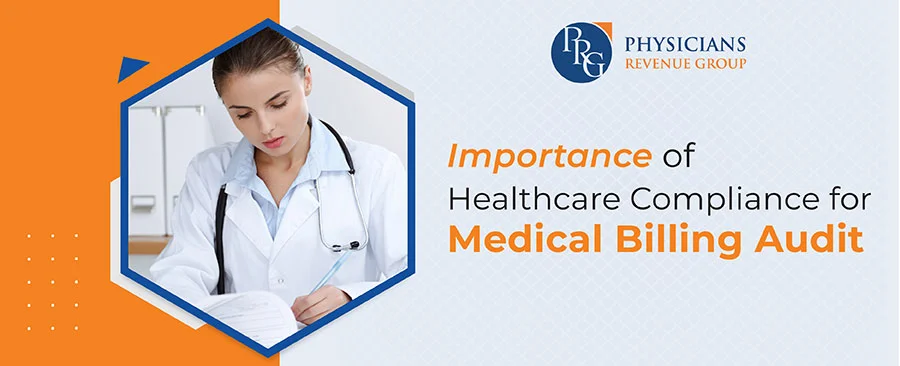
Email: info@prgmd.com | Call: +1 (630) 242-6474
Business hours: 9:00 to 5:00 | Monday to Friday
Email: info@prgmd.com | Call: +1 (630) 242-6474
Business hours: 9:00 to 5:00 | Monday to Friday

Table of Contents
ToggleFollowing healthcare compliance for medical billing audit includes preventive measures and system modifications to enhance security while lowering risks. As a result, institutions and healthcare providers can effectively:
Assessing whether a practice complies with legal requirements, security regulations, and risk management procedures is the primary goal of a compliance audit.
The world of healthcare today is governed through information. Unfortunately, criminals are also interested in healthcare data. Protected health information (PHI) breaches, and malicious attacks to collect patient data are on the rise. Healthcare organizations must bolster their defenses as breaches rise at a 25% yearly rate. Advanced procedures and technological solutions must be implemented to safeguard how organizations use, distribute, and maintain patient data.
The COVID-19 pandemic has significantly impacted telehealth, increasing patient information exchange through remote consultations and monitoring. With these changes, updated HIPAA laws and rules for technology restrict technology use and online prescription requirements while prioritizing patient privacy.
One significant penalty for failing to comply with the OIG’s rules and regulations is exclusion from government-funded healthcare programs, in addition to the following:
To help businesses navigate the constantly evolving state legislation and compliance standards, the Office of Inspector General (OIG) provides healthcare compliance services.
Reviewing Medical Charts
Prospective multi-tier chart assessments can help you increase productivity, lower risk, and stop revenue loss. In addition, healthcare compliance for medical billing audits can help you address issues before they become problems by providing a staff focused on your area of expertise, patient population, and service location.
Services for Document Improvement
You can protect yourself from poor cash flow by implementing documentation enhancement services. As a result, your operational accuracy will increase, you’ll find missed inquiry opportunities, lower clinical risks, enhance patient care and results, and more with the assistance of medical billing experts.
RCM – Revenue Cycle Management
Integrated solutions can help you enhance the overall health of your revenue cycle. Healthcare compliance for medical billing audit evaluates the weaknesses and strengths of your revenue cycle and creates individualized solutions to guarantee effectiveness, consistency, and maximum earned reimbursement.
Post-Audit Training
Close any reporting gaps, whether they arise from evaluation and management coding, encounter information, medical need, grade of specificity, visit data, or guideline criteria. Customized training services help your team navigate legal and financial requirements while producing demonstrable results. You can take the right turn with the help of the knowledgeable group of trained programmers, auditors, and trainers, giving you the opportunity to:
To provide insightful analyses and recommendations, it is very important to understand healthcare operations, compliance, data analysis, and revenue cycle management.
One needs experience working with provider organizations and governmental organizations. Healthcare organizations should completely understand the process of medical billing audits, to assure the successful reimbursement of insurance money from individual providers to hospital systems.
Share:
Categories
Recently Added

What is an ABN in medical billing?

What does a Clearinghouse do During Claims Submission?

What is EOR in Medical Billing?
We Would Love to Assist You!
We treat your data confidentially and don’t share any information with a third party.